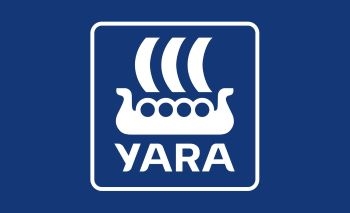First quarter operating income was US $322 million compared with US $248 million a year earlier

Yara's first-quarter net income was US $14 million (US $0.05 per share) compared with US $-119 million (US $-0.43 per share) a year, as improved pricing more than offset the impact of higher energy cost.
EBITDA excluding special items was US $585 million, up from 504 million a year earlier, as improved pricing more than offset higher natural gas cost.
“Yara delivers its eleventh consecutive quarter with improved capital returns, with EBITDA excluding special items up 16%, and continued growth in premium sales. The Yara organization continues to perform well in a demanding environment,” said Svein Tore Holsether, President and Chief Executive Officer, Yara.
"Our cash flow also continued to improve, with US $2.7 billion of free cash flow generated over the last four quarters. We will consider further cash returns in the coming quarters, in line with Yara’s capital allocation policy,” said Holsether.
First quarter operating income was US $322 million compared with US $248 million a year earlier. Earnings per share excluding currency effects and special items was US $0.80, compared with US $0.39 per share in first quarter 2020. EBITDA excluding special items was US $585 million, compared with US $504 million a year earlier.
Yara’s industry fundamentals are robust, as the twin challenges of resource efficiency and environmental footprint require significant transformations within both agriculture and the hydrogen economy. Yara’s leading food solutions and ammonia positions are well placed to both address and create business opportunities from these challenges.
Outlook:
Yara’s industry fundamentals are robust, as the twin challenges of resource efficiency and environmental footprint require significant transformations within both agriculture and the hydrogen economy.
Yara’s leading food solutions and ammonia positions are well placed to both address and create business opportunities from these challenges. Ensuring continuity in food production and related value chains remains a top priority for all countries.
Yara’s market environment is in a positive trend, with increasing food prices creating stronger planting and crop nutrition incentives for farmers. Nitrogen fertiliser markets are robust, with significantly higher prices than a year ago reflecting both stronger demand and limited new supply.
Yara’s industrial business has also picked up, following weaker demand during the start of the pandemic.
Natural gas input prices in Europe have increased from the record low levels in 2020, however the resulting cost impact for Yara has so far been more than offset by the positive effect of higher nitrogen prices globally. Based on current forward markets for natural gas (12 April) Yara’s gas costs for second and third quarter 2021 are expected to be respectively USD 180 million and USD 220 million higher than a year earlier. The estimates may change depending on future spot gas prices and local terms.
Yara has a triple responsibility in the ongoing global pandemic: Firstly, to safeguard its employees, contractors, partners, neighbours and society at large. Secondly, to be a responsible company and act in accordance with government guidelines.
And thirdly, to keep operations running, to help support the supply of food and other essential products to society. This means that the timing of turnarounds, improvement initiatives and the project portfolio will be optimised to reduce the risk of prolonged outages.
Yara’s financial situation is robust, with strong cash flow from operations and lower capital expenditure due to strong capital discipline. Yara has proposed a NOK 20 per share dividend to the annual general meeting, bringing its total cash distribution to shareholders for 2020 to NOK 52 per share, and has also proposed that the general meeting approves a new 5% share buyback authorisation. Improving returns and cash flow may lead to increased payout capacity, and Yara will consider further cash returns in the coming quarters, in line with its capital allocation policy.
Global nitrogen prices have strengthened since mid-2020, as food prices have increased while nitrogen supply growth has been limited. Recent industry consultant projections show higher nitrogen supply growth in 2021, however limited startup activity has been seen so far, and the risk of project delays is stronger than normal due to Covid-19.
Subscribe to our newsletter & stay updated.